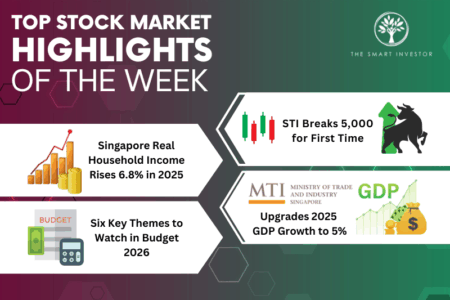If you are an investor, the recent news headlines may sound alarming.
Two of the major US stock indices, the NASDAQ Composite Index and the S&P 500 Index, have entered a correction, defined as a 10% drop from their recent high.
News outlets are also sounding the alarm over inflation and a potential US recession.
But what does all the above mean to you as an investor?
Should you sell everything?
Or could this be an opportunity to scoop up stocks on the cheap?
Your reaction will depend on how you view the stock market.
A place to grow your capital
The market is broadly split into two groups of people – traders and investors.
Traders are keen observers of share price movements.
Their job is to dart in and out of the stock market, using their nimbleness to buy and sell stocks to net them a profit.
Traders generally do not pay attention to the fundamentals of the stocks they purchase – their focus is on the price movements of these stocks.
Investors, on the other hand, are a different bunch.
This group relies on the business fundamentals of the stocks that they purchase to determine what to buy.
Call it patient capital if you will – by holding on to strong businesses over the long term, investors enjoy capital appreciation while also receiving dividends.
Hence, investors view the stock market as a place to grow their capital over time.
And if the aim is to grow your capital, you should look forward to lower prices so that you can accumulate stocks on the cheap.
Because if your focus is on how the business is doing, you should welcome lower prices as a way to profitably grow your investment portfolio.
Volatility is part and parcel of sound investing
If you feel unnerved by the frequent sharp swings in share prices, you’re not alone.
It’s natural to feel worried when you see the stock prices of your stocks decline.
This decline can be due to the aforementioned reasons – corrections that occur because of worries over inflation and a possible recession.
But here’s something you should know.
Volatility, which refers to the up-and-down movements in stock prices, is a normal feature of any well-functioning stock market.
Investors know that volatility is a trait they need to accept to look for attractive bargains.
The key is to control your emotions.
And how do you do that?
By adjusting how you view the stock market.
Seeing it as a place to deploy patient capital, you can then embrace volatility as a way to purchase the stocks you are eyeing.
Loading up on strong companies
Armed with this mindset, it’s easier for you to then load up on strong, well-run companies when their share prices plunge.
Take DBS Group (SGX: D05) for instance.
Singapore’s largest bank by market capitalisation is a well-run financial institution that recently reported a record set of earnings.
For 2024, net profit shot up 11% year on year to a new high of S$11.4 billion.
The bank’s return on equity of 18% also places it seventh among global peers, an impressive achievement.
Should the shares of DBS Group plunge for any reason, it could be a good candidate for your portfolio as the blue-chip lender has demonstrated its resilience through numerous market and economic cycles.
There are many other high-quality businesses that you can consider parking your money in.
All you need to do is wait patiently for an opportunity for volatility to open up a chance for you to purchase at attractive valuations.
Get Smart: The market is your servant, not your master
Remember that the stock market is there to serve you.
Rather than being affected by its emotional whims, you should view it as what it is – a place to deploy and grow your capital.
By mastering your emotions and seeking out strong businesses, you can then profitably grow your portfolio over the long term.
The key is to let the market serve you and not let it control your emotions or actions.
When you achieve this, you will be able to generate a healthy stream of dividends and see your portfolio do well in the long run.
This could be the fastest way to jump from a “newbie” investor to a seasoned pro. Our beginner’s guide shows everything you need to know to buy your first stock and beyond. Click here to download it for free today.
Follow us on Facebook and Telegram for the latest investing news and analyses!
Disclosure: Royston Yang owns shares of DBS Group.





